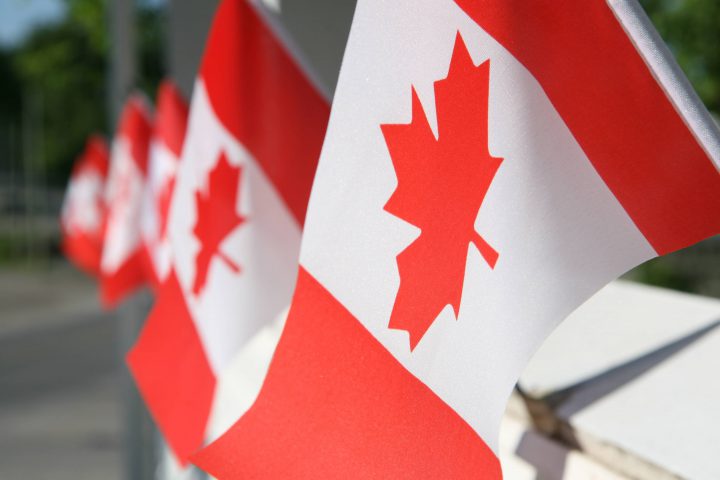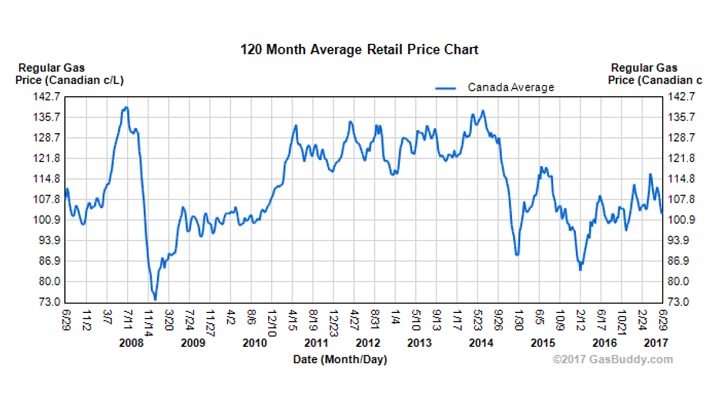Canadians are seeing some relief at the pump as gas prices heading into the long weekend hover around a seven-year Canada Day low.

Gas Buddy’s Dan McTeague says he’s never seen summer gas prices quite like this in his more than two decades of analyzing gas prices.
READ MORE: Reality Check: Do gas prices spike ahead of long weekends?
According to the gas-price-tracking app and website, over the last decade, the national average for gas prices are as much as 25 cents per litre higher on Canada Day than New Year’s Day — but not this year.
“It’s quite unique, and it’s something of a boon to motorists,” said McTeague.
READ MORE: Top natural wonders to see in Canada before you die
Gas has averaged around $1.17 per litre over the last decade. Heading into the Canada Day long weekend, gas prices have been hovering around $1.04 per litre.
Retailers do have a tendency to slightly raise prices on a Friday, to capitalize on folks who are filling up for the weekend. Some regions — southern Ontario and lower mainland B.C. — should especially expect to see a bump Friday, but that should soon recede, said McTeague.
READ MORE: Why this may be the best summer ever to spend your vacation in Canada

Get weekly money news
The low price of crude is largely to blame for the low fuel prices. We started the year with oil around $55 per barrel, compared with the current price of about $45 per barrel.
Another factor is high fuel supply south of the border. The lower demand is due in part to the rise of fuel-efficient vehicles, says McTeague, “there is a real connection between efficiency and the drop in demand.”
Good for the pocketbook, and for tourism
The savings at the pump could mean a little more good times all around this summer, likely to give a boost to tourism and other industries.
Tourism in Canada is already flying high because of the loonie, attracting visitors from outside its borders.
“Canada’s kind of the ‘it’ place right now around the world,” said Maya Lange, VP of global marketing at Destination B.C.
Seen as safe and welcoming, with both cosmopolitan cities and barely-touched wilderness, the country has been making the must-visit lists of Lonely Planet and the New York Times.
“Our numbers are up — in B.C. we had a record year for 2016 and also we’re up this year over 2016, so we’re definitely seeing international numbers rising,” said Lange.
For Canadians wanting to travel on the cheap, Lange recommends hitting the road.
“Doing a road trip is sort of an epic Canadian dream and there’s lots of incredible experiences to have that you can do from your car or an RV and camp along the way, and I think that makes it … fun as well as affordable.”
READ MORE: Think you don’t need insurance when travelling in Canada? Think again
The savings at the pump could help Canadians afford that extra road trip.
“There’s a good likelihood that more people will travel with lower prices,” said McTeague. “They drive more, they buy more, they tend to use it for other things along the way.”
“This is going to be … a very good year for tourism.”
The savings aren’t likely to stop at the pump — you could also see prices drop on groceries or other goods that are impacted by the cost of transportation.
“I think this will be great for fringe economies,” said McTeague. “I think it will also be good for collective pocketbooks. Cost of transportation is down, food prices will stabilize … what goes around really comes around, especially given the pivotal role of transportation costs.”













Comments
Want to discuss? Please read our Commenting Policy first.